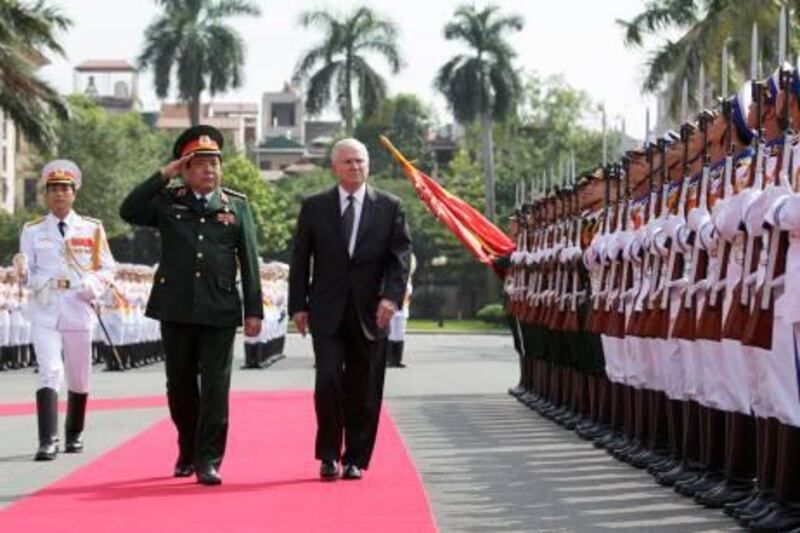BEIJING // The United States reasserted its interest in Asian-Pacific security yesterday as concern grows over China's perceived growing aggressiveness in maritime disputes.
Robert Gates, the US defence secretary, said his country has "long-term interests" in the region and will remain "an active participant" in defence and security issues there.
His comments during a speech in Hanoi might reassure the smaller Asian countries concerned about China's rise amid opposition from Beijing to US engagement in the region. Beijing insists it must solve territorial disputes with each of its much smaller neighbours on a one-to-one basis, instead of with the Association of South-east Asian Nations (Asean) and the US. Mr Gates rejected this approach.
"Relying exclusively on bilateral relationships isn't enough; we need multilateral institutions in order to confront the most important security challenges in this region," he said.
Mr Gates made his comments before talks starting today involving him and his counterparts from the 10 Asean members, plus India, China, Japan, South Korea, Russia, Australia and New Zealand. Also yesterday, Mr Gates met his Chinese counterpart, Liang Guanglie, their first meeting since China cut high-level military exchanges in January over US weapons sales to Taiwan. Mr Liang invited Mr Gates to visit China.
"South-east Asia and Japan would welcome a strengthening of the US capability to be a hedge against the rise of China," said Joseph Cheng, a professor of political science at City University of Hong Kong. China "is not yet a real threat. It's largely the potential of a rising China. The US and Japanese naval strength is stronger than China, but from a long-term perspective they would like to ensure a firm commitment on the part of the US."
This week's talks follow a series of recent disagreements involving China, its neighbours and the US. China expressed concerns over joint naval drills between the US and South Korea in July, and reacted angrily the same month when the US secretary of state, Hillary Clinton, said her country could be a mediator to resolve competing claims in the South China Sea. Ties between Japan and China reached their lowest point in several years last month after a Chinese fishing boat was detained by Japanese coastguard ships near islands claimed by both countries. Some analysts interpreted China's stance on the issue as being more confrontational than would have been expected in the past.
That spat came just a month after a report by the US department of defence indicated China's strengthening of its naval capabilities was motivated by a desire to project power over a wider area. In another row, China is holding nine Vietnamese fishermen arrested near disputed islands in the South China Sea. China claims the South China Sea as its own, but the Philippines, Taiwan, Vietnam, Malaysia and Brunei all take issue with this.
Energy reserves, fishing rights and, most crucially, the shipping lanes for vast amounts of China's energy imports are key to many of the competing claims. Military confrontations are not unknown in the South China Sea, with dozens of lives being lost in a 1974 battle that led to China's current holding of all the Paracel Islands. Further conflicts in 1988 between China and Vietnam resulted in more military deaths.
A nonbinding accord, signed in 2002 by China and Asean with the aim of resolving disputes and preventing confrontations, has failed to end disagreements. The United States recently said an expanded, legally binding code of conduct should be adopted. Mr Liang said China hoped the talks would help formulate a "security mechanism" to maintain regional stability. The growth of China's naval strength will act as "a deterrent" to other Asian countries in their territorial disputes with China, said Wong Yiuchung, a professor in the department of political science at Lingnan University in Hong Kong.
Mr Cheng said that despite the continued growth in China's maritime strength, a genuine military confrontation over the disputed territories was now almost unthinkable.







